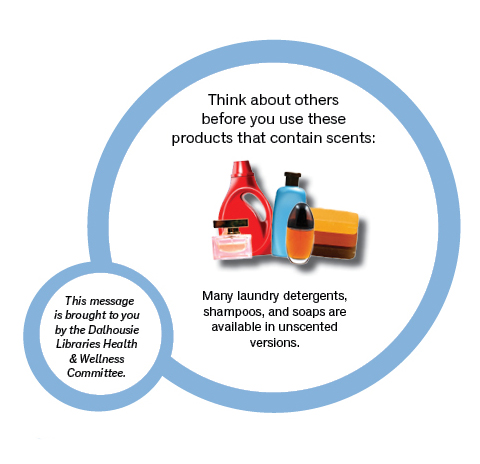The Dalhousie Libraries Health & Wellness Committee are launching a scent free campaign for the Libraries. The purpose of this campaign is to educate staff and library users about the harmful effects of scented products on individuals with scent sensitivities.
The University supports the many students and employees who report that they are harmed when they are exposed to scents which are present in many scented personal care products. Scents in perfume, cologne, hairspray, aftershave, and even some soap and fabric softeners cause serious illness in people who are sensitive to these chemicals. To provide an environment which supports teaching and learning, Dalhousie asks students, staff, faculty, and visitors to refrain from using such scented products while at the University.
Please note that scent free at Dalhousie is a program, not a policy. The fundamental difference between a program and a policy is that a program is meant to educate people about something whereas a policy must be followed. For example, no smoking is a policy that must be followed and enforced while scent free is a program that educates people about potential illnesses and sensitivities regarding soaps, deodorants, etc. to fellow staff, faculty, and students.
New posters reminding people to refrain from wearing and using scented products will be posted in the libraries. New educational bookmarks will also be placed in books at the time of checkout at the Service Point in each library.
For more information about the scent free program at Dalhousie and for advice on how to handle scent sensitive situations, check out: http://www.dal.ca/dept/safety/programs-services/occupational-safety/scent-free.html
We appreciate your assistance in keeping the Dalhousie Libraries and Dalhousie, scent free.


Hello, while sympathetic to the needs of those who are sensitive to scented products, I am surprised by the growing list of scented “no-no’s”. At one time, persons were advised not to wear cologne or (scented deodorant). Now the list of “no-no’s” is getting longer. We are now informed on what practices we should adopt in our own homes. It’s no longer a matter of applying cologne; we are “educated” as what products we should use at home. Is it really your place to tell thousands of patrons what soap or laundry products to use? This is intruding into person’s behaviour in their home. Will we next be hearing that people cannot enter the library who have smoked at home or outside the library on their break? Now THAT is a stench that is offensive.
Thank you for your comments. We are glad that you are sympathetic to the needs of those who are sensitive to scented products.
As part of this education campaign, we are asking people to refrain from using scented products while they are at the university. There are many products beyond cologne and scented deodorant that contain chemicals that are triggers for people with scent-related illnesses, and we are listing examples of what those products are as part of this awareness campaign. It is not our place to tell people which products to use (we don’t recommend or discourage specific brands), but it is our place to help educate people at the university what the scent-free program is about. Which products people choose to use is of course their own choice, but we do want people to be aware of how their choices can affect others.
If you have further questions or comments about the scent-free program at Dalhousie, please contact the Environmental Health and Safety Office at 494-2495 or safety.office@dal.ca
I am very sensitive to products with synthetic fragrances and certain chemicals as well, and although I agree with raising awareness in theory.. these “scent free” campaigns always seem a little extremist and arbitrary.
There are a lot of variables here.. Some chemicals don’t have any fragrance at all yet are extremely harmful, while some fragrances like essential oils may cause little or no irritation in those with MCS and may even have beneficial effects. Yet products that claim to be “unscented” may just have additional masking agents to cover up certain fragrances.
Does the cleaning service for the libraries use products that do not contain harmful chemicals? What about thirdhand smoke from clothes? That’s not only a disgusting smell to almost everyone except smokers, but also potentially cancer-causing. What about pets? Many people have allergies to animals and yet they’re allowed in some of the libraries. Pollinating plants on campus? The list goes on..
Seems like it would be more helpful to explain WHY it’s in ALL of our best interests to avoid certain synthetics and chemicals, rather than issuing a blanket dismissal of anything scented. Wearing a small drop of an essential oil blend is quite different than liberally spraying yourself with a perfume containing any number of unknown ingredients.
The cleaning products used at Dalhousie are from the Avmor Ecopur product line. They are scent-free products for general cleaning surfaces and washroom cleaning. On about a yearly basis, the cleaning staff are required to scrub or strip and re-coat floor surfaces. In these cases, they try to use the lowest concentrate of deep scrub or stripper with minimal scent, to remove old wax on floor surfaces. If you require more detailed information about the cleaning products used at Dalhousie, you can find it here: http://www.avmor.com/avmor_EN/index.php
In our message on the blog, we have explained that scents in perfume, cologne, hairspray, aftershave, and even some soap and fabric softeners cause serious illness in people. We have not included essential oils on the list of scented products that cause illness.
In which Dalhousie Libraries have you seen animals? Beyond service animals (to help the visually impaired, etc.) there are no animals allowed in the Dalhousie Libraries. Any plants within the libraries are non-pollinating, as far as we are aware. If you have observed otherwise, please let us know.
While I understand Dal Libraries were against having a Subway installed in a library, a successful no-scent campaign is currently impossible for the Killam.
Hi Jesse, thanks for your comment. Odours from food are not the same as the scents added to personal care products and detergents. The scent-free program at Dalhousie is focussed on educating people about scents added to products that we wear, because many of those scents are created by chemicals that trigger adverse health reactions in others.
As a staff member who works in the Killam I am very pleased to hear about this initiative. Highly scented products can adversely affect people’s health – from headaches to breathing problems and allergic reactions. Thank you for spearheading this initiative! Where can I get a couple of posters?
Thanks for your comments, Suzanne. I would be happy to give you a couple of posters.
I have found it is not necessarily what the body spray, perfume or cologne smells like but more so the kinds of chemicals used in the makeup of the product. My wish is that people using the Killam refrain from spraying on the colognes which are made by companies who run advertisements aimed at young people (young men in particular). I have witnessed fellow staff members gasping to breathe after interacting with patrons slathered in these chemicals. While trying to educate each new year of students may be daunting, I would be pleased if at least the staff and faculty who work in the Killam could become more aware of the scent free program at Dalhousie. It is not a new program, just one which hasn’t been emphasized. Supervisors should include this information when they train new staff members and tell them how important this is to some of their fellow staff/faculty members.